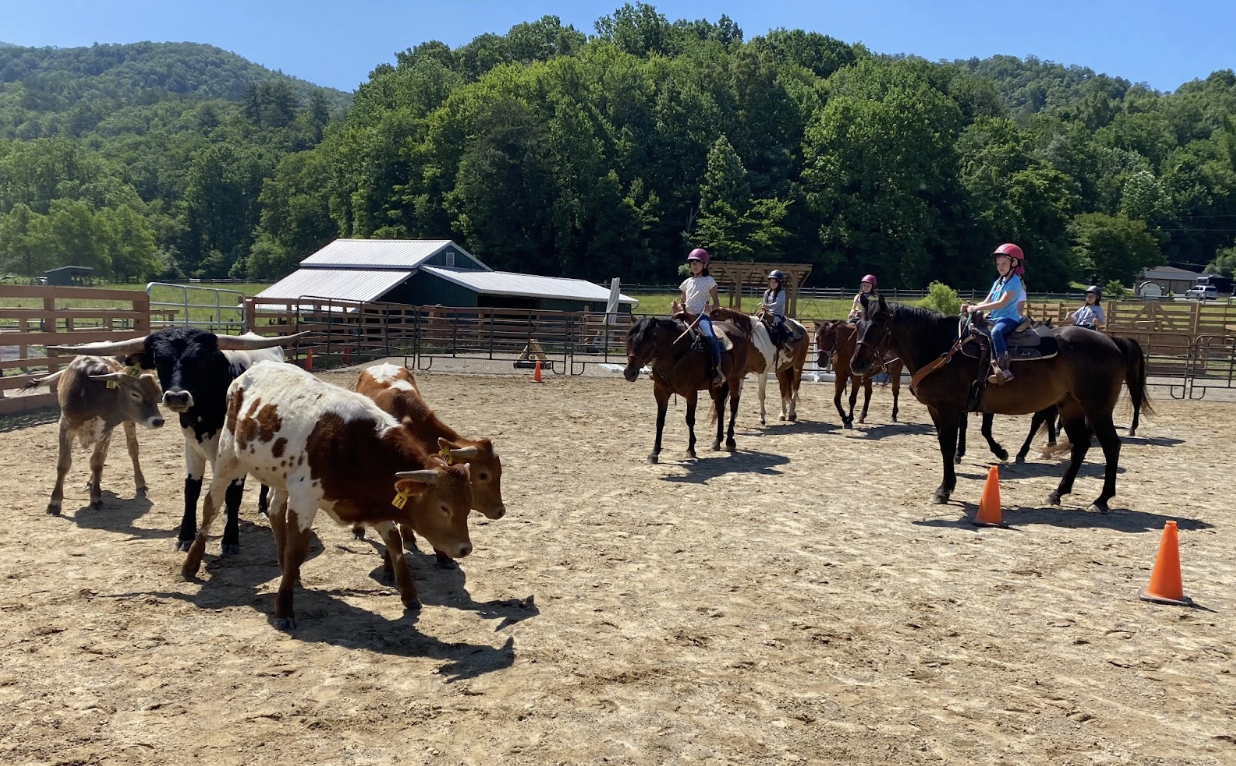By Ryan McCaffrey, WVR Equine Director
We usually get a new group of weanling calves every spring and every fall. We buy from an area producer who raises good, quality stock. Now that our latest batch of weanling calves are here and settled in, we’ve been using them with our students to teach and grow their horsemanship with low-stress livestock handling skills. Our summer camp, Camp Arrowwood, begins each June. Our campers get to enjoy herding the calves as well, some of them on the first ride of their life. Herding cattle is a great application of many things.
Before we bring the calves into the arena, our riders practice communicating with their horse to get them to walk, turn, stop, and back up. Once the calves come into the arena, the riders have to not just communicate with their horses but now they need to communicate with each other. Rider-horse and rider-rider teamwork is important. There is still more communication going on as the cow communicates to the horse and the rider. Hopefully each creature is tuned into all that is being communicated. For the human, it can be like a foreign language. Nearly all of the language is non-verbal and it can be very subtle. Like all communication, it can be frustrating when misunderstandings occur.
Our goal is low-stress handling of the animals–low stress for the humans, the horses, and the cattle. Lower stress allows time for all to think and to learn. Some stockmen like the expression “slow is smooth and smooth is fast.” For the riders, it gives them space to process the skills they’re trying to employ, the coaching they’re receiving, and the complex emotions that can sometimes arise in the process. Once the livestock learns where the release of pressure is, they’re eager to seek it and it brings them peace. For the cattle, low stress also helps weight gain. High stress situations can result in weight loss, which is counter productive when you’re trying to raise animals for meat. How we handle them isn’t the only thing that can cause stress. Excessive fly stress along with heat stress can also slow, stop, or even reverse weight gain. That’s one reason we encourage our various domestic and wild bird populations. You can read more about the chickens and ducks here: https://wvr.org/2023/03/children-help-with-chickens/. We leave most barn swallow nests and we’ve built houses for tree swallows.
After 4-6 months in the horse program, we’ll get another group of weanling calves and the previous group will graduate to the beef herd. Their main job at that point is strictly weight gain. They also attract the attention of passersby if the grazing rotation has them in pastures along our road frontage. The beef cattle help grow our land and help protect the sheep from coyotes as they graze together in the pastures. For those students that become proficient in their skills in the arena, not just riding their horse but also reading the cattle, they may earn the privilege of getting to herd the cattle and sheep across campus when the pasture rotation requires a larger move. This takes a more in-tune partnership between horse and rider as well as greater situational awareness from the rider. Outside the confines of the arena, there are a lot more variables.
Herding cattle is a great parallel of our riders and the life of faith for the disciple of Christ. Ephesians 2:8-10 reads, “For it is by grace you have been saved, through faith—and this is not from yourselves, it is the gift of God—not by works, so that no one can boast. For we are God’s handiwork, created in Christ Jesus to do good works, which God prepared in advance for us to do.” As a riding instructor, I can’t ride someone’s horse for them. They have to take what they’ve been given and put it into practice. It won’t always go perfectly, but the failures often provide a route forward for when you find yourself in a similar situation next time. So it is for the believer. God has given us salvation in Christ, given us His Spirit to live in us, then gives us His works to accomplish with His help. When we sin, repentance and His words to us in the Bible give us a path forward for when we find ourselves tempted again. Someday our students will launch and we hope that the things they learn in reading the subtleties of the livestock, in hearing and following instructions, in giving and receiving feedback, will be seeds that the Lord will use to bear much fruit for the glory of Christ in their lives as they seek to follow Him.


